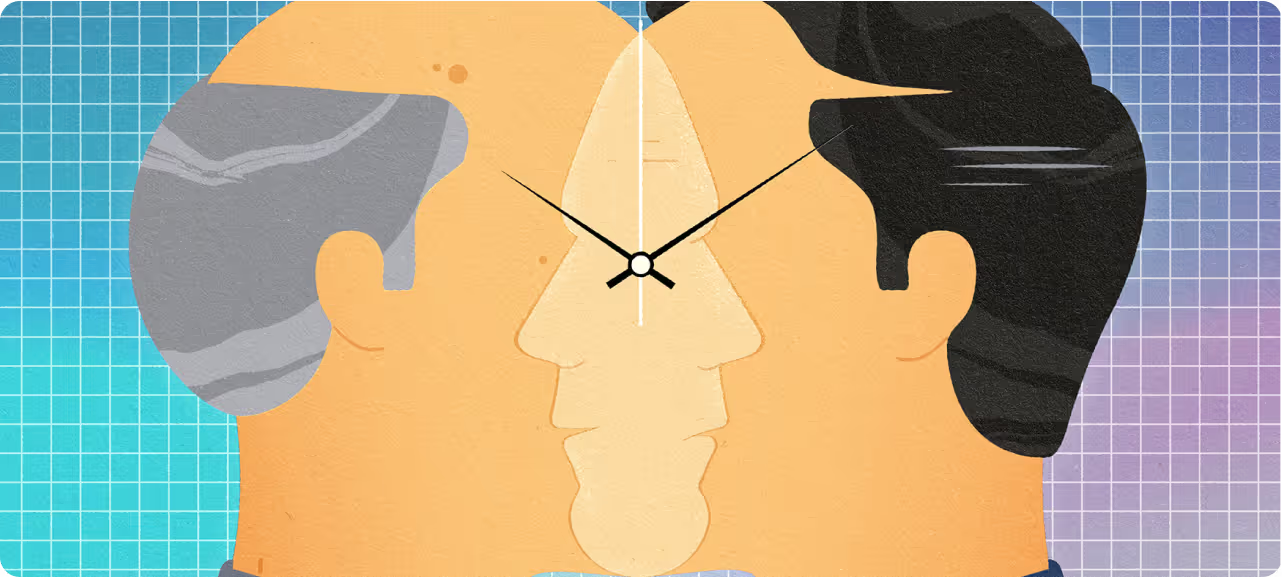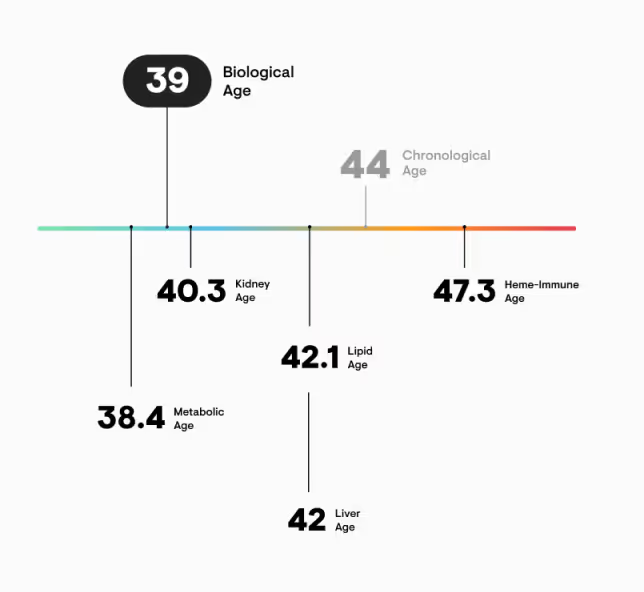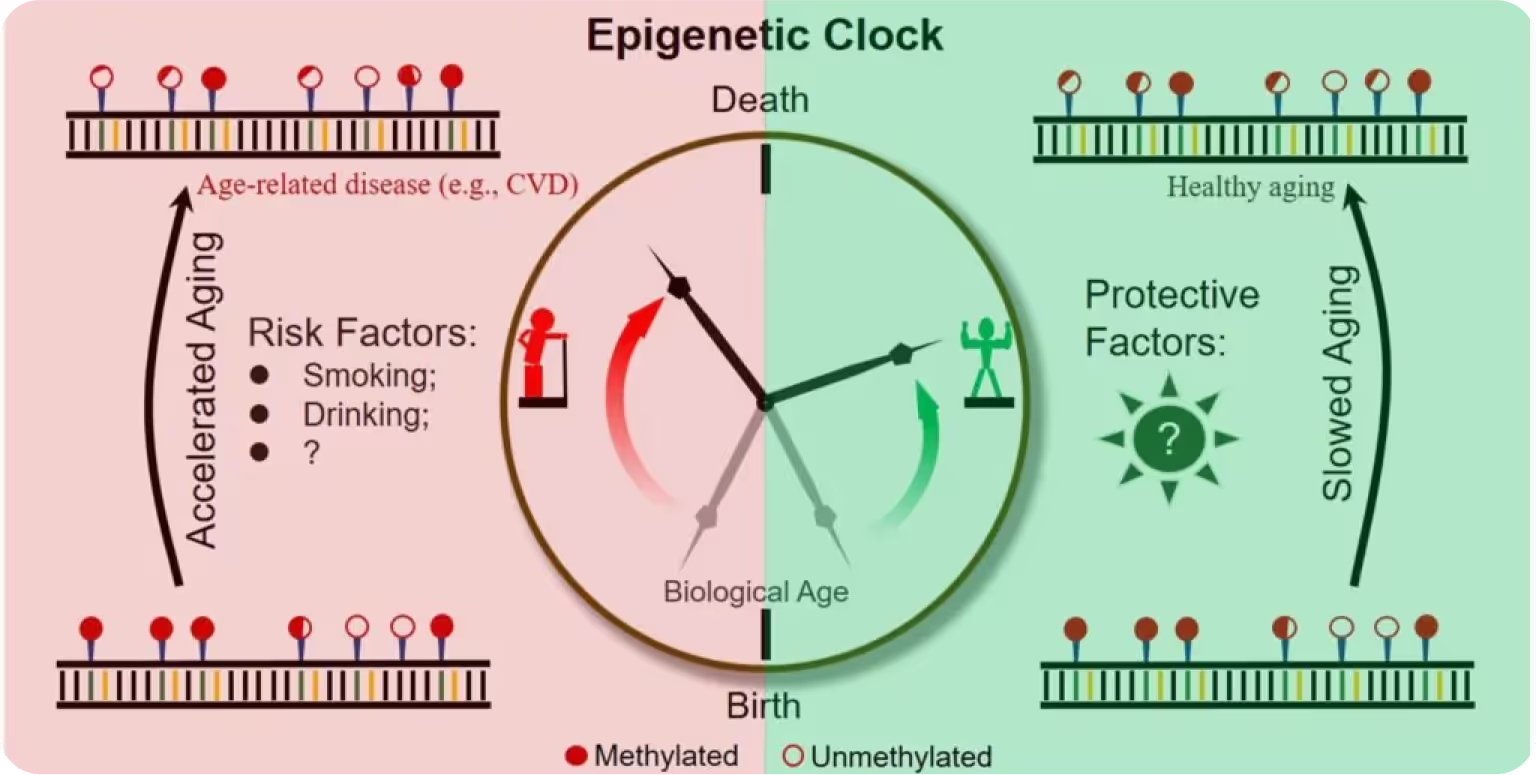Biological Age Test Australia, Calculate Your Bio Age in 1 Minute
Curious about your biological age? Check your bio age in 1 minute with our guide. Get insights into biological age testing methods & test your bio age in Australia today!

As we get older, the number on our driver's license may not reflect how our body is truly aging. That’s why more people are turning to science-backed tools to check biological age—a more accurate measure of how well your body is functioning on the inside. If you’re looking to take control of your health and longevity, a biological age test can provide valuable insights into how lifestyle, genetics, and environment are impacting your aging process.
A biological age test assesses the condition of your cells, tissues, and organs to estimate how old your body is functioning compared to your chronological age (the number of years you’ve been alive). The test evaluates various biomarkers—indicators like blood sugar levels, cholesterol, and even DNA methylation patterns—which give a more personalised view of how your body is ageing. Using a biological age calculator, you can get a rough estimate of how your health stacks up.
While chronological age is simply the time that’s passed since you were born, biological age digs deeper into the state of your body. For example, two 40-year-olds might have very different biological ages based on their health, habits, and genetic factors. One might have a biological age of 35, while the other might have a biological age of 50, reflecting different rates of ageing. Biological age is influenced by lifestyle, diet, exercise, stress, and environmental exposure, offering a dynamic view of your overall health. Biological age calculators offer an accessible starting point, though lab testing is more accurate.
There’s more than one way to calculate your biological age—and each method gives different insights into how your body is ageing.
One common approach is PhenoAge, which uses data from standard blood tests to estimate how old your body “acts.” It looks at key biomarkers like glucose levels, white blood cell count, albumin, and more to assess your risk of age-related diseases. It’s not just about lifespan—it gives a sense of your healthspan: how well your body is functioning now and what might be around the corner.
Another method is DNA methylation testing, considered the gold standard in longevity science. DNA methylation is a natural process that changes how your genes work over time. The problem? As we age, this process can go off track, causing cellular damage that speeds up ageing. Think: wrinkles, joint pain, and slower recovery. These tests measure how much that damage has progressed, giving you a molecular-level view of your bio age.
Both methods are useful—but together, they provide a clearer, more personalised picture of how fast (or slow) you’re really ageing.
Biological age tests are primarily used to assess how well a person is ageing and to identify areas of health that may need attention. These tests help you understand how your lifestyle choices such as diet, exercise, and stress management are impacting your ageing process. For longevity enthusiasts, it's a powerful tool for tracking and optimising health to potentially slow down or reverse aspects of ageing. In Australia, a biological age test can be your first step toward smarter preventative care.
Biological age tests show you how old your body is acting compared to your chronological age. They provide a snapshot of your health, highlighting areas like inflammation, oxidative stress, and metabolic health. By understanding these factors, you can make targeted changes to improve your health and potentially reduce your biological age.
Yes! There are a number of providers who can determine your biological age. Most of these will require getting a blood test done and that will be included in the purchase but will be done separately. A biological age test in Australia is now more accessible thanks to innovations in health tech.
Some providers include:
Costs for biological age tests in Australia can vary, depending on the type of test and the provider. The price for a comprehensive biological age test may range from $500 to $1,000, depending on the inclusions like blood panels or genetic testing.
While you can get your biological age measured in Australia, there are a few more tangible and useful preventative programs to explore. Everlab for example offers other testing, e.g. blood tests, CGM, DEXA, to give you a holistic view of your health. The main difference here is a biological age test will indicate whether you are aging well or not, however it will not instruct you on how to improve things. At Everlab you are prescribed specific actionable protocols designed to reduce your risk of disease and improve your health as you age.
While Everlab does not recommend relying solely on online measures, we do offer an online biological age calculator that may give rough indications of your biological age.

Your biological age test will provide you with a number that represents your body’s functional age compared to your chronological age. For example, if you're 45 years old but your biological age is 40, you're ageing more slowly than expected. In addition, you'll receive a breakdown of the various biomarkers that contribute to your biological age, including inflammation levels, metabolic health, and cardiovascular risk.
Your biological age results help you understand the areas of your health that may be ageing faster or slower. A lower biological age can indicate good metabolic function, low inflammation, and better physical fitness, while a higher biological age may flag issues such as poor cardiovascular health, high oxidative stress, or imbalances in blood sugar. These insights allow you to take action and improve your overall health and longevity.
Unfortunately most biological age tests do not provide you with the necessary actions to improve your health. For such advice we recommend joining a preventative health or longevity program.
A heart age calculation is a tool used to estimate how healthy your heart is compared to your actual age. It takes into account various risk factors, such as blood pressure, cholesterol levels, smoking status, diabetes, body mass index (BMI), and family history of heart disease, to give a "heart age" that might be younger or older than your actual age. The main difference between heart and biological age is the focus - heart age focuses specifically on cardiovascular health, while biological age considers the overall aging process across multiple systems in the body.

A diet rich in whole foods—like fruits, vegetables, lean proteins, and healthy fats—provides essential nutrients that support cellular function, reduce inflammation, and improve metabolic health. Antioxidants found in foods such as berries, nuts, and leafy greens combat oxidative stress, a key contributor to biological ageing. Conversely, processed foods, excessive sugar, and unhealthy fats can speed up the ageing process.
Exercise is crucial for maintaining a healthy biological age. Regular physical activity improves cardiovascular health, boosts metabolism, and enhances muscle mass—all of which contribute to a lower biological age. Studies have shown that both aerobic exercises, such as running or cycling, and resistance training can help maintain physical function and reduce age-related decline. Sedentary lifestyles, on the other hand, can lead to accelerated ageing and increase the risk of chronic conditions like heart disease and diabetes. A VO2 max test would provide greater insights into the impact of your aerobic capacity on your biological age and overall health.
Good sleep is one of the most undervalued components of biological health. During sleep, the body repairs cells, removes toxins, and regulates hormones. Poor sleep quality or chronic sleep deprivation can lead to increased inflammation, hormonal imbalances, and impaired cognitive function, all of which can age the body prematurely. Prioritising 7–9 hours of quality sleep each night is essential for maintaining optimal biological health.
Chronic stress is a major factor in biological ageing. When you're under constant stress, your body produces high levels of cortisol, a hormone that, in excess, can cause inflammation, disrupt metabolic processes, and accelerate cellular ageing. Long-term stress can contribute to conditions such as heart disease, high blood pressure, and mental health issues, all of which negatively impact biological age. Techniques like mindfulness, meditation, and exercise can help manage stress levels, reducing its negative effects on your body and overall health.
Inherited traits can significantly impact biological age. Some people may have genes that predispose them to longevity or, conversely, to certain age-related diseases. However, genetics typically accounts for only a portion of how quickly or slowly you age.
Understanding your biological age gives you the power to take proactive steps toward optimising your health and longevity. Unlike your chronological age, biological age reflects the true state of your body, influenced by your lifestyle, genetics, and overall health. At Everlab, we help you uncover the key factors impacting your ageing process and provide actionable insights to improve your wellbeing.
Depending on the type of test, you may be asked to provide a blood sample, undergo a physical assessment, or perform non-invasive DNA testing. Once the samples are collected, they are analysed for various biomarkers. Results are typically available within a few weeks, and you’ll receive a detailed report explaining your biological age and recommendations for improvement.
While not a main test, it may be useful to check biological age annually or every two years to create a new benchmark. Regular testing allows you to track your progress, adjust your lifestyle changes, and ensure you're on the right path to slowing down the ageing process.
The tests provide an estimate based on a range of biomarkers, so while it may not pinpoint an exact age, it offers valuable insights into your overall health. The accuracy improves when combined with other assessments such as blood panels and physical health evaluations. Using both a biological age calculator and formal lab tests gives a more accurate picture.
1. Dr Alexis Shields – What Is Biological Age and Why Does It Matter?
https://dralexisshields.com/biological-age
2. Dr Kara Fitzgerald – PhenoAge: The Most Accurate Biological Age Test?
https://www.drkarafitzgerald.com/younger-you-phenoage
3. Mayo Clinic – Understanding the difference between biological age and chronological age
4. USYD – What is your real ‘biological age’?
https://www.sydney.edu.au/news-opinion/news/2018/02/14/what-is-your-real-biological-age-




Join 1000's of Australians improving their health with proactive, personalised healthcare.